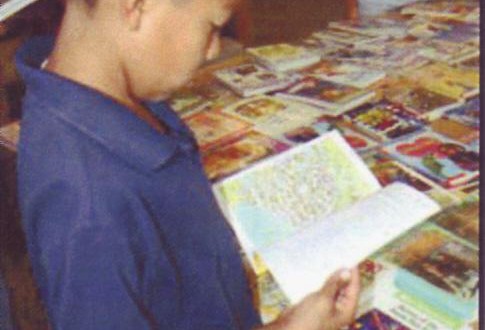Salazar Elementary School and the Salazar Partnership
The Salazar Partnership is a program begun in 1998 that provides volunteers and other resources at Salazar and Agua Fria Elementary Schools in Santa Fe. Here are some exerpts from their most recent program evaluation:
All the Partnership activities essentially provide support for students that neither the school nor Santa Fe Public Schools (SFPS) can provide. There are three broad categories.
* Volunteers. Volunteers primarily assist individual students or groups of students as requested by teachers, most often in reading. They also assist in meeting special needs, such as registration, eye testing, library, administration, etc. Over forty participated during the year, typically working one to six hours in a given week. The first volunteers in 1998 and now about a a third come from the congregation of the United Church of Santa Fe (UCSF).
* Book distributions. Several programs that the Partnership initiated provide students with free books. During the 2007-2008 school year, over 3,000 free books were given to students in the two schools. The programs are:
* Reading is Fundamental (RIF). A book to keep is given to every student three times during the year. This program is also supported by individual members of the UCSF congregation and Los Alamos National Bank. Each student gets to choose which book they want. To date over 20,000 books have been distributed. The teachers say the kids get really excited on the RIF book days. `For some of the children the only books they have at home are the ones from the RIF,` says Donna Piatt, third-grade teacher. The Salazar program was selected by RIF to receive 2008 Program Excellence Honors awarded by the Met Life Foundation–one of twenty-five chosen out of 3,500 programs. The award was based on community involvement and how many other organizations participate in the school to bring a wide range of education possibilities to the school. The program provides books for all levels of reading ability, and many of the books are in Spanish.
* The Dictionary Project was made possible through gifts made in memory of a volunteer and with the help of the national Dictionary Project. Webster`s English language dictionaries are given to every third-grade student and new students in grades four to six. In addition, about 40 percent of students are given a Spanish/English dictionary. Over 1,000 have been distributed. Teachers say, `It`s awesome that they give each student a dictionary. We use them all the time.` (Candace Thomas, fourth-grade teacher) `The work I do with my volunteer couldn`t happen without each student having their own dictionary.` (Candace O`Hara, fifth-grade teacher)
* Rand-McNally atlases are given to all fifth and sixth-grade students.
* A copy of Peter Becomes a Trail Man by William C. Carson is given to each student in the fourth through sixth grades at book signings, at which they get to listen to an author talk about the subject matter and how he wrote the book.
* Health Promotion Project. The Health Promotion Project has evolved over a period of two-and-a-half years through regular meetings with individuals from Salazar, Agua Fria, La Familia Medical Center, the SFPS, and other nonprofit organizations. The partnership provides funding to pay for the PE teacher (assumed by the state in 2007-2008), assure nurses are full time, provide administrative support, education and medical support from La Familia, and physical education equipment. Through the United Church of Santa Fe, the Partnership also provides funds for the principal to use in the case of student or family emergencies.
There can be no doubt that the programs of the Partnership have increased the potential for student success–given hundreds the opportunity to reach their potential. It is apparent in the atmosphere in the school, in the attitude and moral of the teachers, in the reports from volunteers, and the responses of the teachers, staff, students, and often their parents.
We believe that the most effective way to increase the opportunities for low-income students in Santa Fe is to provide the individual attention and basic support that SFPS cannot provide on its own, i.e. emulate what has been done at Salazar. In short, support students in individual SFPS schools and not attempt to establish a new institution or program based on fashionable ideas or impose standard district-wide supplementary programs on every school. This conclusion may not be new, but often seems to get lost in the obsession with testing and the assumption that concentration on a particular subject, organization or scheme will lead to success in itself without the recognition of individual needs and differences. There is an argument that schools cannot be held responsible for broad social inequities in the United States. That conclusion is certainly true, but with appropriate support, individual schools can take steps to alleviate the problems of individual students created by those inequities.






